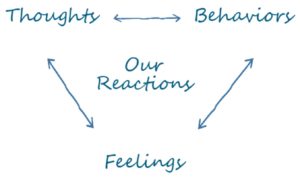Use This Framework to be A Better Mentor
Using Thoughts, Feelings and Behaviors As a Framework
I became a better marriage mentor when I started to understand the interplay between thoughts, feelings and behaviors. This is a core concept to understand that will help you to be an effective marriage mentor.
It will help you to break down particular incidences. It will also help you to know what questions to ask.
Let’s get into this in more detail.
Thoughts
 Thoughts influence your feelings and your behaviors.
Thoughts influence your feelings and your behaviors.
If you dwell on the thought, “This is so unfair”, you are more likely to feel resentful and behave in a way that tears down the marriage bond.
If you think, “We can work this out”, you are more likely to feel and behave in a way that builds the marriage bond.
Feelings
Telling yourself to feel differently doesn’t usually work. Your feelings tend to follow your thoughts and behaviors. Feelings are usually the last to change.
If you work on changing your thoughts and behaviors. Your feelings will usually follow.
Behaviors
Behaviors are your choice. Even if you are feeling angry or scared, you can choose how you react.
For example, treat your spouse well, even when you don’t feel like it. That is making a choice.
Behaving in a loving or gracious way can influence your thoughts and feelings.
How They Come Together
Our thoughts, behaviors and feelings come together to capture how we react in a situation.
Our reactions are a combination of our feelings, thoughts and behaviors.
For example, let’s say Michelle, my wife, leaves a wet towel on the floor.
I think, “I do not exist just to pick up your towel. I feel angry and irritated. So I react by throwing the towel at her and yelling, “You are such a slob. Pick up your towel.”
It’s likely that even more negative thoughts and feelings will perpetuate themselves. They will go round and round in my head. I’ll get locked into a set of behaviors.
I’m not saying you should dismiss your feelings. It’s tough to choose your feelings, but you can choose your thoughts. When we choose our thoughts and behaviors. Our feelings will usually follow.
In this case, I could choose to think that she’s not intentionally trying to irritate me. She must have been in a hurry and accidently left the towel on the floor. If that think that, my behavior will come out in a much different way. We can talk about what happened.
How Does This Work for Mentors?
Let’s say a couple comes and meets with you and explains a big fight like the one above. What can you do?
You can start by exploring their thoughts and feelings below the behaviors. We often start by asking questions around these topics. What was the behavior? What were you feeling at that time? What thought or assumption prompted it?
In this case, it might look like this:
- Behavior – Phil criticizes & throws towel
- Feeling – Irritated & angry
- Thought – She’s taking advantage of me (assumes poor intent)
Once you have this identified, you can go in different ways:
- Thought – Is the thought assumption accurate? Is there more underneath that thought? Is there a healthier thought? In this case, it could be that she doesn’t have poor intent, but was just in a hurry.
- Behavior – What might have been a healthier reaction to your anger? Could you have done something else, like cooling off for a few minutes.
- Validation – Have the couple validate each other’s thoughts and feelings.
Tips for Marriage Mentors:
- Use this framework – Use thoughts, feelings and behaviors as a framework to work on change.
- Identify the thought – Sometimes, identifying our thoughts is difficult. If you can help couples to identify their thoughts, it may help them to look at the accuracy of their assumptions.
- Focus on validation – Allow both partners to validate each other.





Thanks alot for the wonderful material that Im sure will be very helpful. Im requesting for some thoughts and advice regards a Couple who lives in Australia. Besides Prayer which is so Important I would like Ur Advice. So kindly let me know your mail id through my mail. thanks alot.
I hear that you are looking for advice. It’s tough for me to give specific advice, but I’m happy to give concepts that you might be able to apply. Feel free to leave me a note on the Contact page.
Thanks so much for all your tips and ideas! They really help me with my work with couples!
Thanks for the encouragement!
You sound like you are working with couples. I like to learn from others as well. If you have tips or ideas that have worked for you, I’d love to hear them!
Phil